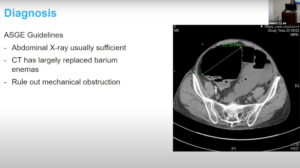NEW YORK (Reuters Health) – Children diagnosed with ulcerative colitis have a good chance of attaining remission after 1 year of treatment with azathioprine or 6-mercaptopurine, according to the results of an observational cohort study.
Writing in the American Journal of Gastroenterology online January 11, Dr. Jeffrey S. Hyams, with Connecticut Children’s Medical Center in Hartford, and colleagues note that thiopurines are commonly used in pediatric ulcerative colitis based on experience in treating adult cases. To assess the effectiveness of this therapy, the authors analyzed data from the Pediatric Inflammatory Bowel Disease Collaborative Research Group Registry.
Data were available on 394 children diagnosed with ulcerative colitis at a mean of age of 11. Among this group, 197 were treated with a thiopurine, and 133 of them were evaluable at 1 year after starting treatment.
The researchers report that 65 of the 133 children (49%) were no longer taking corticosteroids at 1 year and had inactive disease, without the need for rescue treatment with infliximab, cyclosporine/tacrolimus, or surgery.
Rates of corticosteroid-free inactive disease at 1 year a were not statistically different whether thiopurine treatment was initiated within 3 months of diagnosis (46%) or after 3 months from diagnosis (52% ), according to the report. Age and gender were not factors either.
The effects of treatment were quite durable, based on Kaplan-Meier analysis. “The likelihood of avoiding rescue therapy with infliximab, calcineurin inhibitors, or colectomy after starting a thiopurine was 73% at 1 year and then gradually decreased to 59% by 5 years,” Dr. Hyams and colleagues found.
Thiopurine therapy was discontinued because of an adverse event in 11 patients: pancreatitis in 4, increased serum aminotransferases in 2, vomiting in 2, abdominal pain in 1, pruritus in 1, and increased gastrointestinal symptoms in 1.
The authors note that while a randomized controlled trial would be ideal, “a double-blind placebo-controlled trial of thiopurines in children with corticosteroid-dependent or corticosteroid-refractory ulcerative colitis is unlikely to occur.”
Dr. Hyams and colleagues also point out that, nowadays, most moderate or severe cases would be treated with infliximab or a calcineurin inhibitor. In milder cases, however, thiopurines still have an important role. Based on the results of their observational study, they conclude, “In those children in whom concomitant infliximab or previous calcineurin inhibitor therapy is not used, ~ 50% of those treated with a thiopurine will achieve CS-free inactive disease within a year.”
Reference:
Outcome Following Thiopurine Use in Children With Ulcerative Colitis: A Prospective Multicenter Registry Study
Am J Gastroenterol 201.1.




